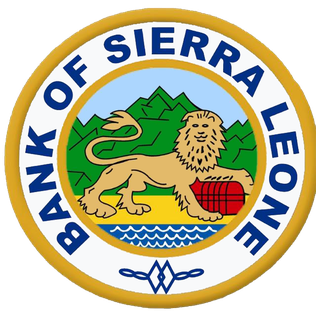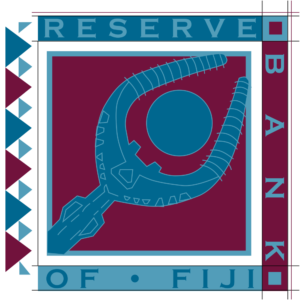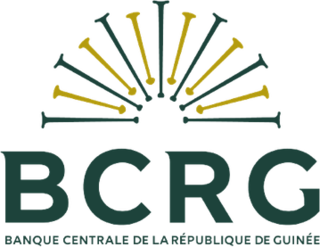
The kwacha is the currency of Malawi as of 1971, replacing the Malawian pound. It is divided into 100 tambala. The kwacha replaced other types of currency, namely the British pound sterling, the South African rand, and the Rhodesian dollar, that had previously circulated through the Malawian economy. The exchange rate of the kwacha undergoes fixed periodical adjustments, but since 1994 the exchange rate has floated. In 2005, administrative measures were put in place by Bingu wa Mutharika to peg the exchange rate with other currencies. Banknotes are issued by the Reserve Bank of Malawi. In May 2012, the Reserve Bank of Malawi devalued the kwacha by 34% and unpegged it from the United States dollar.

The Central Bank of Brazil is Brazil's central bank. It was established on Thursday, 31 December 1964, a New Year's Eve.

The State Bank of Pakistan (SBP) is the Central Bank of Pakistan. Its Constitution, as originally laid down in the State Bank of Pakistan Order 1948, remained basically unchanged until 1 January 1974, when the bank was Nationalized and the scope of its functions was considerably enlarged. The State Bank of Pakistan Act 1956, with subsequent amendments, forms the basis of its operations today. The headquarters are located in the financial capital of the country in Karachi. The bank has a fully owned subsidiary with the name SBP Banking Services Corporation (SBP-BSC), the operational arm of the Central Bank with Branch Office in 16 cities across Pakistan, including the capital Islamabad and the four Provincial Capitals Lahore, Karachi, Peshawar, Quetta. The State Bank of Pakistan has other fully owned subsidiaries as well: National Institute of Banking and Finance, the training arm of the bank providing training to Commercial Banks, the Deposit Protection Corporation, and ownership of the Pakistan Security Printing Corporation.

The Bank of Uganda is the central bank of Uganda. Established in 1966, by Act of Parliament, the bank is wholly owned by the government but is not a government department.

The Bank of Tanzania is the central bank of the United Republic of Tanzania. It is responsible for issuing the national currency, the Tanzanian shilling.

The Bank of Sierra Leone is the central bank of Sierra Leone. It issues the country's currency, known as the Leone. The bank formulates and implements monetary policy, including foreign exchange.
The National Bank of Ethiopia is the central bank of Ethiopia. Its headquarters are in the capital city of Addis Ababa. Mamo Mihretu is the current governor of the bank.

The Reserve Bank of Fiji is the central bank of the Pacific island country of Fiji. The responsibilities of the RBF include the issue of currency, control of money supply, currency exchange, monetary stability, promotion of sound finances, and fostering economic development.

The Central Bank of Nigeria is the central bank and apex monetary authority of Nigeria established by the CBN Act of 1958 and commenced operations on 1 July 1959.

The Central Bank of Paraguay is Paraguay's highest monetary authority, and the country's governing body, in finances and economics. Its headquarters are in Asunción's Carmelitas neighbourhood. The institution was created by Law 18/52 of March 25, 1952. In 1995, the legal frame of the Central Bank was replaced by Law 489/95.

The Bank of Ghana is the central bank of Ghana. It is located in Accra and was formed in 1957. The bank is active in developing financial inclusion policy and is a member of the Alliance for Financial Inclusion.

The Bank of Zambia (BoZ), is the central bank of Zambia.

The National Bank of Rwanda is the central bank of Rwanda. The bank was founded in 1964. The current governor of the bank is John Rwangombwa.

The Bank of the Republic of Burundi is the central bank of Burundi. The bank was established in 1966 and its offices are in Bujumbura.

The Central Bank of the Republic of Guinea is the central bank of Guinea. The headquarters of the bank is located in the capital city of Conakry. The current governor is Dr Karamo Kaba.

The Central Bank of Trinidad and Tobago is the central bank of Trinidad and Tobago.

The Maya Declaration is a global initiative for responsible and sustainable financial inclusion that aims to reduce poverty and ensure financial stability for the benefit of all. It is the first global and measurable set of financial inclusion commitments by developing and emerging economies.
The Global Policy Forum (GPF) is organized by the Alliance for Financial Inclusion, or AFI, as the keystone event for its membership and financial inclusion policymakers worldwide. Each year, it is co-hosted by a different member institution in a different region of the world. AFI has roughly 100 member institutions from nearly 90 countries, making the AFI GPF the most important and comprehensive forum for regulatory institutions with an interest in promoting financial inclusion policy. The AFI GPF is focused on developing and improving national financial inclusion strategies and policies and is used as a platform for senior financial regulators to exchange ideas as well as engage in peer-to-peer learning activities.
The Agricultural Development and Marketing Corporation, usually known as ADMARC, was formed in Malawi in 1971 as a government-owned corporation or parastatal to promote the Malawian economy by increasing the volume and quality of its agricultural exports, to develop new foreign markets for the consumption of Malawian agricultural produce and to support Malawi's farmers. it was the successor of a number of separate marketing boards of the colonial-era and early post-colonial times, whose functions were as much about controlling African smallholders or generating government revenues as in promoting agricultural development. At its foundation, ADMARC was given the power to finance the economic development of any public or private organisation, agricultural or not.

Dalitso Kabambe is an economist, banker and politician from Malawi. He served as the 13th Governor of the Reserve Bank of Malawi from 2017 until 2020 .


















